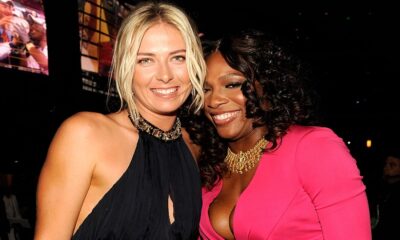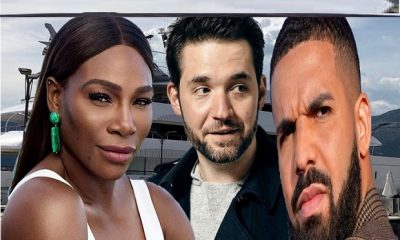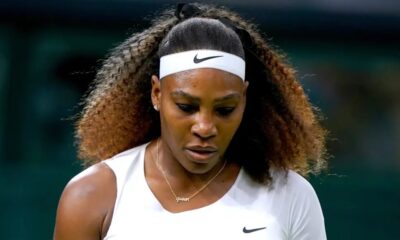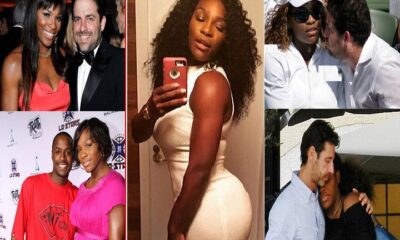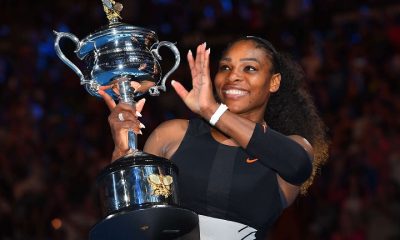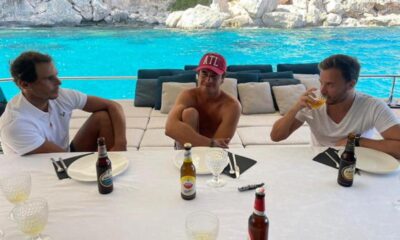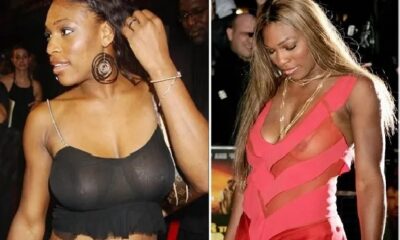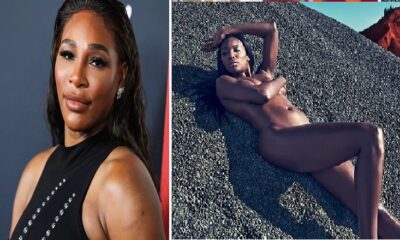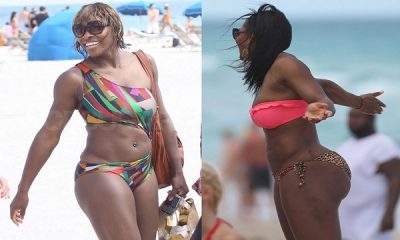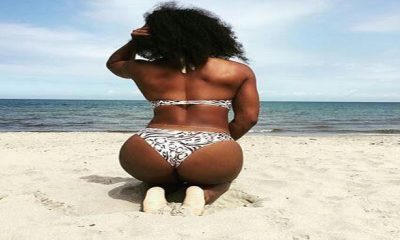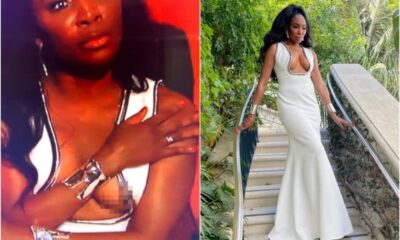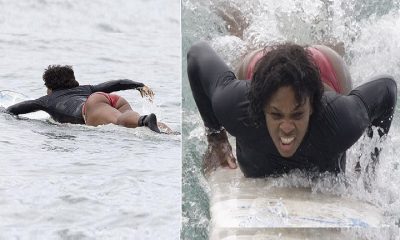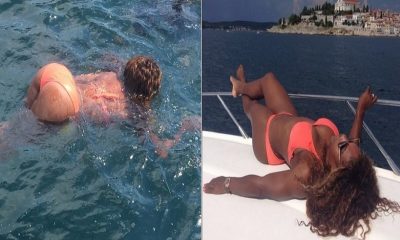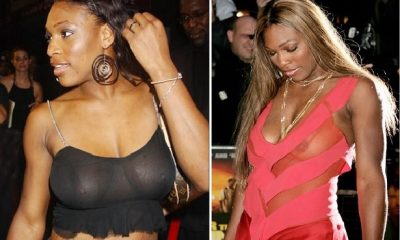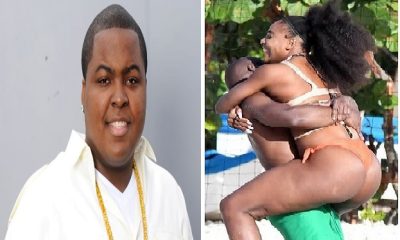Tennis
For Novak Djokovic, the Goal Is Still Titles, but ‘More Than That’
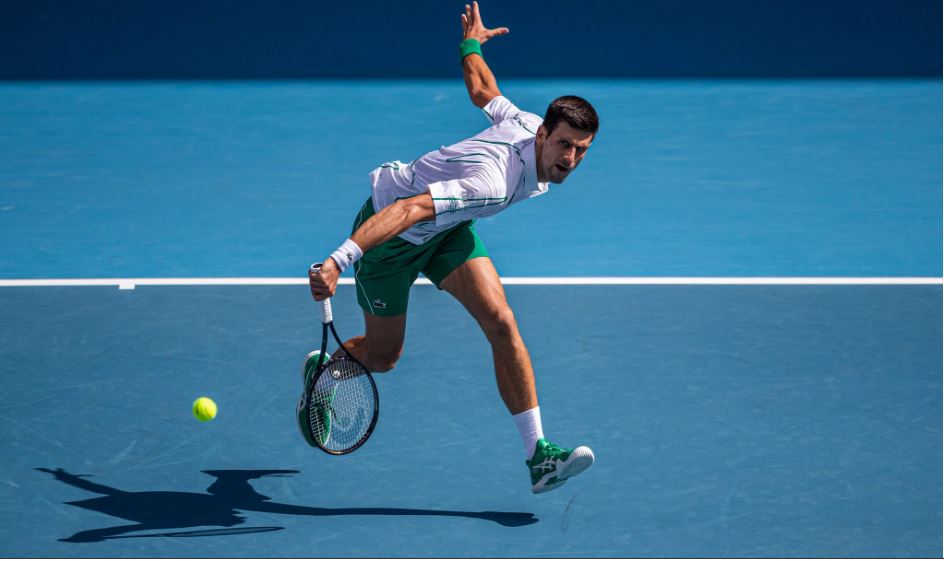
Of the Big Three in men’s tennis, Roger Federer is the pleaser and Rafael Nadal is the fighter. Call Djokovic the searcher.
MONTE CARLO — Outside an office building not far from where Novak Djokovic resides, a Lamborghini was parked on a street lined with luxury hotels, restaurants and sports cars.
Inside, Novak Djokovic was talking about hard times.
“Ten Deutsche marks, I remember 10 Deutsche marks,” said Djokovic, the 16-time Grand Slam singles title winner who went into the Australian Open this week as the reigning champion.
As he spoke, he slammed his hand on a conference room table, just as his father, Srdjan, had once slammed a 10-mark bill on the kitchen table of their cramped rented apartment in Belgrade.
This was during the violent breakup of the former Yugoslavia in the 1990s. Djokovic does not remember precisely when, but he remembers his father’s words.
“Ten Deutsche marks was like 10 dollars, and my father said, ‘This is all we have,’” Djokovic said. “And he said that more than ever we have to stick together and go through this together and figure out the way. That was a very powerful and very impactful moment in my growth, my life, all of our lives.”
By 1999, Djokovic and his family had found a way for him to leave Serbia at age 12 for Niki Pilic’s tennis academy in Munich, the start of his journey toward the top of his sport.
Djokovic has shown remarkable resilience and drive, spurred by the memories of growing up in the midst of conflict, privation and uncertainty.
But at age 32, after earning more than $100 million in prize money and hundreds of millions more from sponsorships, he is in a very different time and place.
He explained that he and his wife, Jelena, and their children — a 5-year-old son, Stefan, and a 2-year-old daughter, Tara — start their mornings in Monaco by greeting the day on the balcony of their apartment, which overlooks the Mediterranean Sea.
“We wake up early, because I take my son to school, so we prepare our juices in the morning in the kitchen, and then we go out and watch the sunrise, and then we do our hugging session and singing session,” he said. “And we do a little yoga.”
Djokovic chuckled, a bit self-consciously. But he believes the private ritual reflects how he has changed. In his view, he is no longer playing tennis to prove himself but to improve himself and the lives of those around him.
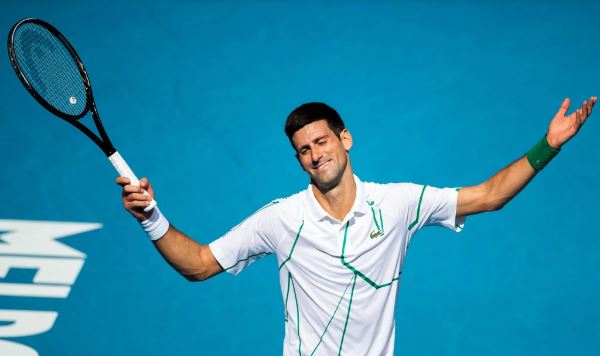
Of the 16 Grand Slam singles titles for Djokovic, seven have come at the Australian Open.
For the first 15 minutes of an interview last month, there was no need (or opportunity) to ask a question. Djokovic, who rarely gives in-depth interviews about his personal life but speaks in long, sometimes meandering paragraphs, shook hands firmly, took a seat and started riffing, apologizing intermittently for the monologue.
“Everybody talks about trophies, achievements, records, history, and I’m really blessed to be in a position to be one of the guys in the mix and in the midst of these kinds of conversations,” he said. “I am really grateful for the career I’ve had, but for me right now, tennis is more a platform than an obsession about individual achievement.”
And yet the tennis world is perhaps more focused than ever on individual achievement as Djokovic, Roger Federer and Rafael Nadal jostle for history and championships. Collectively, they have dominated men’s tennis for a decade.
Nadal has won 19 Grand Slam singles titles, just behind Federer’s 20, the record for men. Djokovic’s 16 rank him third, and he has a good chance for more if he continues to move, compete and serve as well as he has recently. He is nearly one year younger than Nadal, and six years younger than Federer.
Djokovic, like Nadal, is playing down the title race even if, unlike Nadal, he has made it clear that Federer’s career record is an objective. He recognizes that the numbers and his staying power present an opportunity.
“I don’t see tennis anymore only as I’m going to go there, and I’m going to win the trophy, do everything possible to achieve that, and once that’s done it’s done, and that’s the only reason I’m playing,” he said. “I’ve finished with that kind of chapter in my life. I guess through the evolution of my life I came to the stage where it’s more than that.”
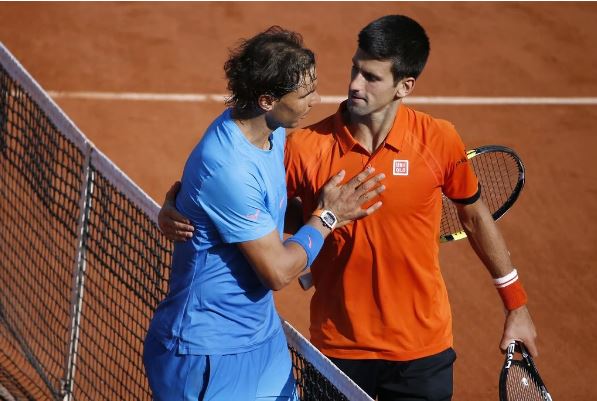
Djokovic and Rafael Nadal at the French Open in 2015.
He and Jelena want to grow their family foundation, which is focused on early childhood education. They want to finish a book on wellness and help answer the questions Djokovic says he gets about how to live a purposeful, healthy life.
Djokovic at this stage is speaking similarly to another champion when he was in his early 30s: Andre Agassi, the once-tormented American who found new energy for tennis after founding a school in Las Vegas, his home city.
Djokovic was never as conflicted about tennis as Agassi. But Agassi, now 49, helped coach Djokovic during one of the most difficult periods of his career — 2017 and early 2018 — before an elbow operation finally helped him shake free of a funk. Agassi, who never had a formal contract with Djokovic, has said he thought his friend was too slow to have surgery. But the two remain close, and Djokovic said he sees parallels in their lives and careers.
“He was one of the very influential people in my life, who actually allowed me to come to all of these realizations even more,” Djokovic said. He added: “If you see things from a larger perspective, it’s quite interestingly the same in terms of understanding what the next step in life is. I will eternally be grateful to him.”
Two of the current Big Three are relatively easy to label. Nadal is the fighter, the supreme in-the-moment competitor. Federer is the pleaser, preternaturally elegant on the move or at rest. But Djokovic, less beloved on a global scale than his rivals, has been harder to pin down. Perhaps his description should spring from that elusiveness. Call him the searcher.
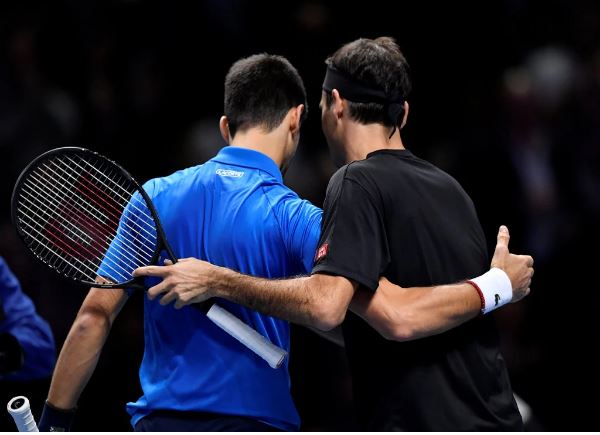
Roger Federer, right, and Djokovic embrace after a match in November.
“He is a searcher,” said Marian Vajda, his longtime coach and confidant. “It seems that the things are perfect, but suddenly he wants to change in some way.”
Through the years, Djokovic has switched to a gluten-free and dairy-free diet, practiced meditation and visualization and tinkered repeatedly — and not always successfully — with his service motion. He has used a personal hyperbaric chamber during tournaments. Most recently, he split with an analytics consultant in part because Goran Ivanisevic, one of Djokovic’s coaches, believed they needed get to back to “more basics” and not rely on “all these numbers.”
But Djokovic is committed to experimentation.
“There are so many athletes, so many tennis players, who play so well in practice, and then it comes to the match, and it’s a different story,” he said. “You might have a good match or two or a good month or two, but how can you consistently be there? That tonic or formula of success is like a holy grail for any athlete. How can I really optimize everything and be in a balanced state of mind, body and soul every season for the rest of my career and really be able to peak when I need to?
“I think the No. 1 requirement is constant desire and open-mindedness to master and improve and evolve yourself in every aspect. I know Roger has been talking about it, and it’s something I feel most top athletes of all sports agree on. Stagnation is regression.”
For Vajda and for Djokovic, the restlessness helps explain the pull of the philosophical. Djokovic is trying to channel some of his innate fire and temper it, too.
“There were the years when he was very impatient,” Vajda said. “All the time, he was saying, ‘When, when, when am I going to be No. 1?’ And I would say, ‘When it arrives, just be patient but we have to do certain things in a proper way in order to get there.’”
Djokovic can be a challenging pupil and a challenging personality. On the court, there are still times when he seems most effectively and evidently fueled by anger.
But there is also an emerging side, reflected in his marathon victory over Federer in last year’s Wimbledon final, when he saved two match points and prevailed in a five-set duel that for all its brilliant points of light and fight, felt above all like a battle of concentration with neither player wanting to break out of his tennis-sensei bubble to give the other any emotional fuel.
It was a strikingly different vibe from that of another epic final: Djokovic’s 2012 Australian Open victory over Nadal, which was full of fiery fist pumps, bulging eyes and grinding rallies that, after nearly six hours, left neither man able to stand at the awards ceremony.
“The Australian Open was an out-of-body experience,” Djokovic said. “But in Wimbledon I was more conscious of what was happening to me.”
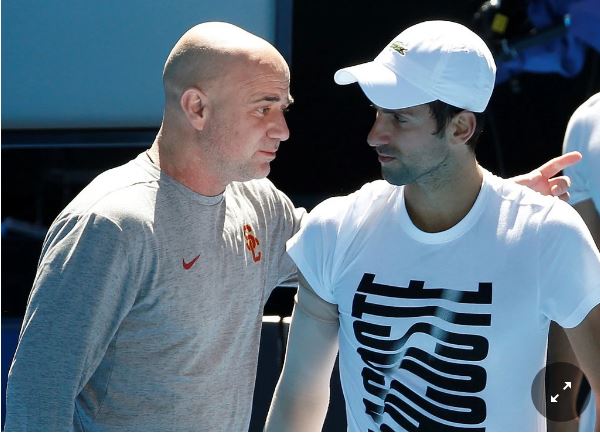
Andre Agassi, left, speaking with Djokovic during a practice session at the Australian Open in 2018.
It has been just about an hour since the interview began, and there is a knock on the door. Djokovic gets up as the door opens to reveal a slightly stooped figure wearing a sweatshirt with the hood up: Agassi.
He is in Monte Carlo, advising another player, Grigor Dimitrov, and they have the conference room booked for a team meeting.
Agassi and Djokovic do a double take.
“Do you believe in coincidences?” Djokovic says in a booming voice.
“Never, never, never,” Agassi says.
They exchange an embrace and news, including an update on Agassi’s son with his wife, Steffi Graf — Jaden, a talented pitcher who has committed to play baseball at the University of Southern California.
“The Yankees were in the house the other day, so the draft is always possible,” Agassi says. “It’s scary, different than tennis in that you don’t eat what you kill. The next level has to believe in you to get a chance.”
Agassi makes it clear he still believes in Djokovic.
“Life’s not done, and I understand everybody is still playing,” Agassi says of the Big Three. “But he’ll be recognized as the best.”
Djokovic says it helps to have a clear purpose, even if it is a different purpose.
“I had to find my reason,” Agassi says. “It’s so important to have that reason.”
Agassi soon excuses himself, and Djokovic begins speaking about parenthood. He knows he will not be slamming a 10-euro note on his kitchen table. He wants his children to know about his childhood but not to be burdened by it.
“I definitely don’t want my kids to go, ‘Oh my God. Here he goes again, saying I didn’t have this, I never had that, and you have everything,’” he says. “I don’t want that because my kids are born in this family in this way and these circumstances, and I respect that.”
There is soon another knock on the door. This time it is Dimitrov. They need the room, and Djokovic needs to pick up Stefan at school.
Down the stairs, into the street and past the Lamborghini, Djokovic breaks into a run, dodging traffic with a backpack slung over one shoulder.

